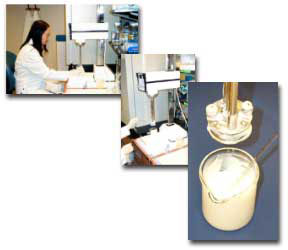Nanoemulsions
Nanoemulsions are non-toxic lipid droplets a few hundred nanometers in diameter and made from surfactants approved for human consumption and common food substances that are 'Generally Recognized as Safe' (GRAS) by the FDA. These emulsions are easily produced in large quantities by mixing a water-immiscible oil phase into an aqueous phase with a high-stress, mechanical extrusion process that is available worldwide.
This process yields a uniform population of droplet particles that are stable for years even at elevated temperatures. Studies have indicated that nanoemulsions have broad-spectrum antimicrobial activity against bacteria, enveloped viruses, fungi, protozoa and spores, due to their ability to lyse these organisms. In contrast, studies of nanoemulsions in animals have shown these compounds to be very well tolerated on the skin and mucous membranes. These attributes provide a broad therapeutic index when the nanoemulsions are used in humans as topical treatments for disorders including Herpes Labialis, cutaneous fungal infections, vaginitis, and respiratory infections. This material holds such unique promise and low risk that the FDA allowed Phase II Clinical Trials for the treatment of Herpes Labialis with Good Manufacturing Procedures (GMP) nanoemulsion to be conducted.
The nanoemulsion was developed under contract from the Defense Advanced Research Projects Agency (DARPA) under the Unconventional Pathogen Countermeasures program.
